Sigma 24-35mm f/2 DG HSM Art Review

Introduction
The Sigma 24-35mm f/2 DG HSM Art is a new wide-angle zoom lens for full-frame and APS-C DSLR cameras that covers three popular fixed focal lengths - 24mm, 28mm and 35mm. It offers the equivalent angle of view as a 36-52mm lens on an APS-C system (depending on the crop factor). The Sigma 24-35mm f/2 DG HSM Art features a constant maximum aperture of f/2 throughout the zoom rane and a rounded 9 blade diaphragm which creates an attractive blur to the out of focus areas of the image. It has a minimum focusing distance of 28cm /11.8in and a maximum reproduction ratio of 1:4.4. The Sigma 24-35mm f/2 DG HSM Art is the fourth lens in the recently introduced Art line (the other ranges are Contemporary and Sports). The Sigma 24-35mm f/2 DG HSM Art lens is currently available for £949.99 / $999.99 in the UK and the US, respectively.
Ease of Use
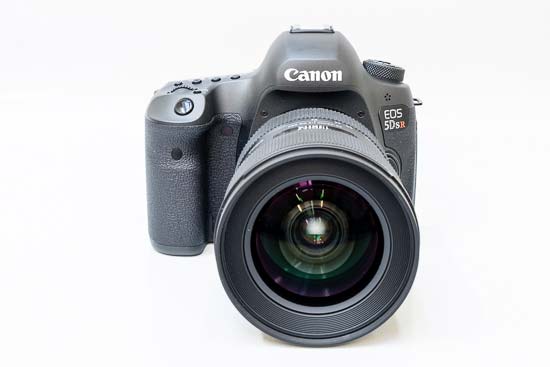 The Sigma 24-35mm f/2 DG HSM Art lens mounted on a Canon EOS 5DS R
The Sigma 24-35mm f/2 DG HSM Art lens mounted on a Canon EOS 5DS R
Weighing in at 940 grams and measuring 12.27cm in length, the Sigma 24-35mm f/2 DG HSM Art is a big lens given its modest zoom ratio. As seen in the photos below, it complements a full-frame camera like the Canon EOS 5DS R well and also doesn't look too out of place on a smaller APS-C camera like the Canon EOS 700D.
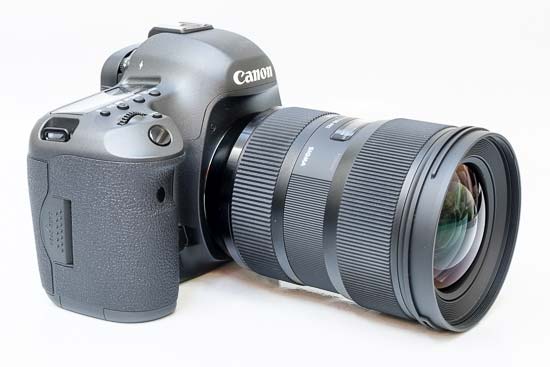 The Sigma 24-35mm f/2 DG HSM Art lens mounted on a Canon EOS 5DS R
The Sigma 24-35mm f/2 DG HSM Art lens mounted on a Canon EOS 5DS R
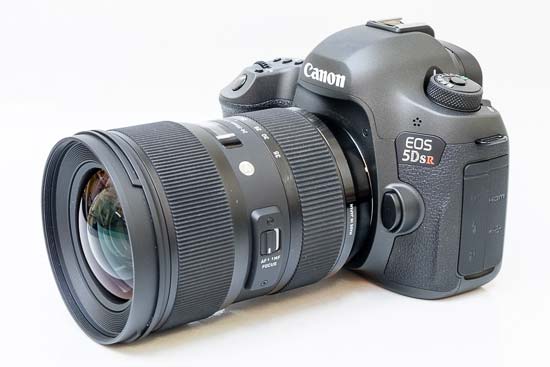 The Sigma 24-35mm f/2 DG HSM Art lens mounted on a Canon EOS 5DS R
The Sigma 24-35mm f/2 DG HSM Art lens mounted on a Canon EOS 5DS R
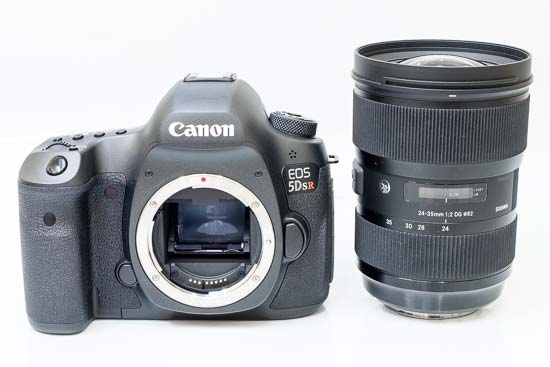 The Sigma 24-35mm f/2 DG HSM Art lens alongside a Canon EOS 5DS R
The Sigma 24-35mm f/2 DG HSM Art lens alongside a Canon EOS 5DS R
Build quality is excellent. The lens has a plastic shell with a mixture of metallic parts and a new compound material, TSC (Thermally Stable Composite), used inside. It also incorporates a brass bayonet mount that's supposed to be more durable. The optical elements are made of high-grade glass. The focus ring is pleasingly wide and ridged for easier grip.
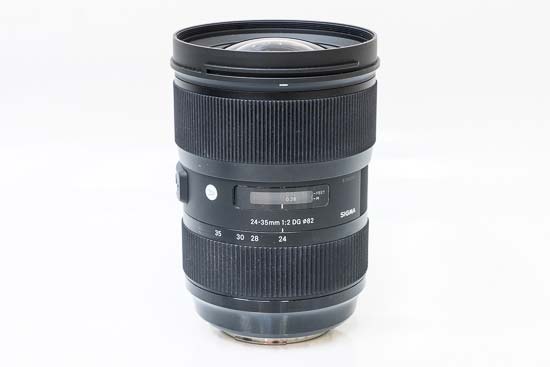 Side of the Sigma 24-35mm f/2 DG HSM Art lens
Side of the Sigma 24-35mm f/2 DG HSM Art lens
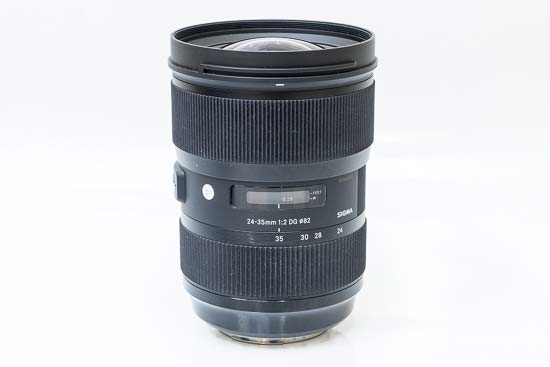 Side of the Sigma 24-35mm f/2 DG HSM Art lens
Side of the Sigma 24-35mm f/2 DG HSM Art lens
In terms of features, the Sigma 24-35mm f/2 DG HSM Art offers all the basics that you need. The main exception is the lack of built-in Vibration Reduction, although the fast maximum aperture of f/2 mostly makes up for this.
 Front of the Sigma 24-35mm f/2 DG HSM Art lens
Front of the Sigma 24-35mm f/2 DG HSM Art lens
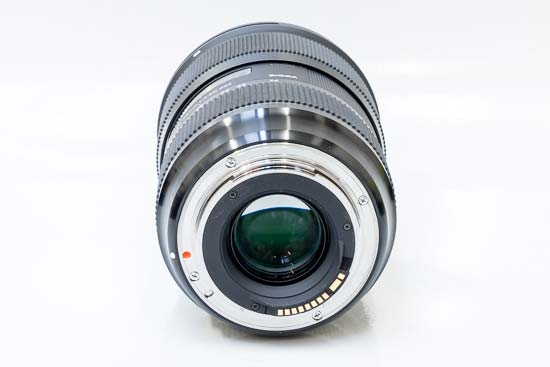 Rear of the Sigma 24-35mm f/2 DG HSM Art lens
Rear of the Sigma 24-35mm f/2 DG HSM Art lens
Focusing is usefully internal and manual focusing is possible when set via the Focus switch on the lens barrel. Full-time manual focus override is also available at any time simply by rotating the focus ring.
A clear distance scale in both feet and meters runs from the closest focusing distance of 0.28m / 0.92 ft to infinity.
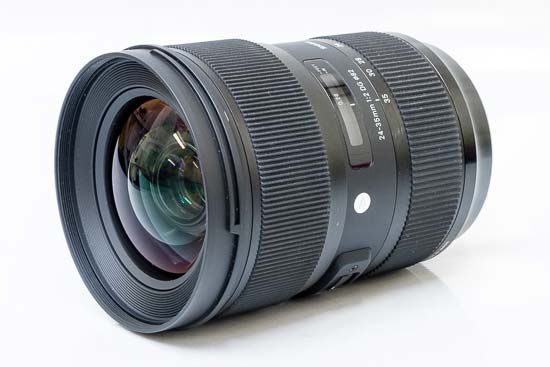 Front of the Sigma 24-35mm f/2 DG HSM Art lens
Front of the Sigma 24-35mm f/2 DG HSM Art lens
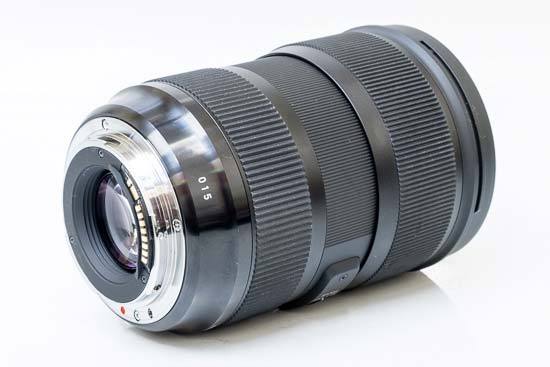 Rear of the Sigma 24-35mm f/2 DG HSM Art lens
Rear of the Sigma 24-35mm f/2 DG HSM Art lens
The Sigma 24-35mm f/2 DG HSM Art ships with a good quality soft case and also a plastic petal-shaped lens hood. It accepts 82mm filters.
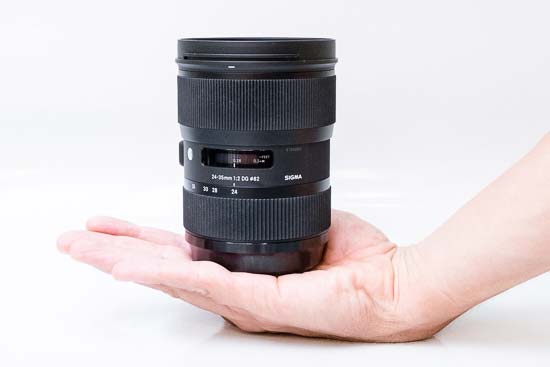 The Sigma 24-35mm f/2 DG HSM Art lens in-hand
The Sigma 24-35mm f/2 DG HSM Art lens in-hand
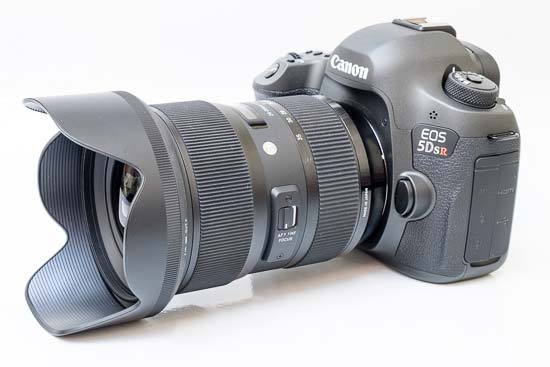 Front of the Sigma 24-35mm f/2 DG HSM Art lens, with the supplied lens hood fitted
Front of the Sigma 24-35mm f/2 DG HSM Art lens, with the supplied lens hood fitted
Focal Range
At the 24mm focal length the angle of view is 84.1 degrees.
 Field of view at 24mm
Field of view at 24mm
At the 24mm focal length the angle of view is 63.4 degrees.
 Field of view at 35mm
Field of view at 35mm
Focusing
The Sigma 24-35mm f/2 DG HSM Art lens has a wide focus ring. There are hard stops at both ends of the range, making it easier to set focus at infinity. Polariser users should be pleased that the 82mm filter thread doesn't rotate on focus.
When it comes to auto-focusing, the Sigma 24-35mm f/2 DG HSM Art zoom is a fairly quick performer, taking about 0.25 seconds to lock onto the subject when mounted on the Canon EOS 5DS R that we tested it with.
We didn't experience much "hunting", either in good or bad light, with the lens accurately focusing almost all of the time. It's also a very quiet performer, thanks to the built-in HSM (Hyper Sonic Motor), which makes this lens well-suited to video recording.
Chromatic Aberrations
Chromatic aberrations, typically seen as purple or blue fringes along contrasty edges, can be detected in shots where this is high contrast, as shwon in the examples below.
 |
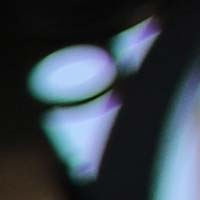 |
Light Fall-off
With the lens set to its maximum aperture of f/2, there is very significant light fall-off in the corners at both ends of the focal range. Stopping-down to f/4 virtually eliminates this.
 Light fall-off at 24mm
Light fall-off at 24mm
 Light fall-off at 35mm
Light fall-off at 35mm
Flare
A wide-angle lens will always be susceptible to flare, and the Sigma 24-35mm f/2 DG HSM Art is no exception even with the lens hood fitted. If you include the sun - or any other strong light source - in the frame, you will likely see a number of ghosts as well as a bit of veiling.
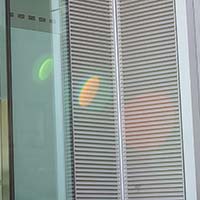 |
 |
Macro
The Sigma 24-35mm f/2 DG HSM Art isn't claimed to be a macro lens, but it delivers fairly good performance nonetheless. It has a minimum focusing distance of 28cm/11in and a maximum magnification ratio of 1:4.4. The following example demonstrates how close you can get to your subject at 35mm, in this case a Compact Flash memory card.
 Close-up performance
Close-up performance
Bokeh
Bokeh is a word used for the out-of-focus areas of a photograph, and is usually described in qualitative terms, such as smooth / creamy / harsh etc. In the Sigma 24-35mm f/2 DG HSM Art lens, Sigma have employed an iris diaphragm with nine rounded blades, which has resulted in nice bokeh in our view. We do realise, however, that bokeh evaluation is subjective, so we've included several 100% crops for your perusal.
 |
 |
 |
 |
Sharpness
In order to show you how sharp this lens is, we are providing 100% crops on the following pages.
